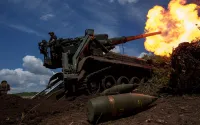14 June 2006 Sarah Olson
US Army First Lieutenant Ehren Watada says, "I've come to believe this is an illegal and an immoral war, and the order to have us deploy to Iraq is unlawful. I won't follow this order and I won't participate in something I believe is wrong."
On Wednesday, June 7th, Lieutenant Watada became the first commissioned officer to publicly announce his refusal to deploy to Iraq. He said, "The war in Iraq violates our democratic system of checks and balances. The wholesale slaughter and mistreatment of the Iraqi people with only limited accountability is not only a terrible moral injustice, but a contradiction to the Army's own Law of Land Warfare."
The very next day, Watada's commanding officers read him his rights. They opened an investigation into Lieutenant Watada's alleged violations of Articles 133 and 88 of the Uniform Code of Military Justice (UCMJ): conduct unbecoming an officer and a gentleman, and making "contemptuous" statements against the president, respectively.
"I think I'm being watched very closely," Lieutenant Watada says. "But I'm still going to speak out. This isn't going to stop me." Despite the extra scrutiny, Watada says he doesn't regret his decision to publicly denounce the war. Legrand Jones is a member of Watada's legal defense team and says the lieutenant's statements are well within his rights. "Just because you join the military doesn't mean you give up the first amendment." Jones says the Army's efforts are simply intimidation tactics.
The Fort Lewis public relations office denied knowledge of any investigation. Spokesman Joe Hitt said, "Lieutenant Watada hasn't done anything wrong, and he's performing his duties to satisfaction." Further, Hitt says, he cannot comment about ongoing investigations.
Lieutenant Watada's action has sparked a groundswell of support. Veterans, anti-war advocates, military families, and members of religious communities have given Lieutenant Watada their support. On the anniversary of the distribution of the Pentagon Papers, Daniel Ellsberg said, "Watada's courage here, I hope, will be contagious to his fellow officers. It should leave them to question the path of honor in this illegal war." Ellsberg, who was himself an infantry officer, says Lieutenant Watada has shown foresight and courage in his defense of the Constitution.
When soldiers speak publicly against a war, it is not uncommon that they face retaliation. Jeff Paterson is a former Marine, and the first military serviceperson to refuse to deploy to the 1991 Gulf War. He has been speaking with Lieutenant Watada since March of this year and says publicly refusing to deploy to Iraq is an inspiring decision. "Certainly there are much easier ways to choose to not go to Iraq. The military seems to have a special resentment toward people who dissent publicly." Paterson says this hasn't diminished Watada's dedication. "I've worked with a lot of people since the first Gulf War, and I don't think I've run into anyone as dedicated to speaking as Lieutenant Watada."
The Pentagon recently announced that 8,000 soldiers had gone AWOL during this Iraq war. A recent Zogby poll shows that 72 percent of soldiers in Iraq would like the US to pull out completely by the end of 2006. What makes Lieutenant Watada's situation unique is not just that he is a commissioned officer. It's clear he would rather remain in the military - were it not for what he says is an illegal war. This dedication is what makes Watada's critique of the Iraq war so cogent, and so potentially devastating for the Army.
"There's certainly a lot of questioning about the war from all levels of the military," says Steve Morse, director of the GI Rights Hotline. At a time when the Army continues to miss its recruiting goals, Morse says Lieutenant Watada's bold criticism gives legitimacy to other soldiers questioning the war. "People feeling alone in their opposition, no longer feel so alone. There will be more space for people in the military to think creatively about resisting war."
But what are the speech rights for members of the military? Do they have legal rights to speak publicly about a war they think is illegal or just plain wrong? The Army is investigating Lieutenant Watada for speaking "contemptuously" about the president, but what, precisely, is contemptuous speech?
For the most part, military personnel can demonstrate peacefully, petition Congress, and express opinions on whatever topic they choose, both in writing and in conversation. These rights are tempered, however, by section 3-2 and 3-3 of the Department of Defense Directive 1325.6, which promulgates guidelines on handling dissident and protest activities among members of the armed forces. They say "the service members' right of expression should be preserved to the maximum extent possible, consistent with good order and discipline and the national security," and that "no commander should be indifferent to conduct that, if allowed to proceed unchecked, would destroy the effectiveness of his or her unit." Many regulations also guard against activities which lack discipline, or that may negatively impact unit cohesion. Article 88 of the UCMJ, which forbids contemptuous speech against the president, is a broad and little-used provision. Most previous prosecutions of Article 88 took place during the Civil War and World War I, and the last known case of an Article 88 prosecution was in 1965. That case was Howe vs. The United States, in which Second Lieutenant Henry Howe held a sign, in civilian clothing at an off-Army base demonstration, that read, "Let's have more than a choice between petty ignorant fascists in 1969." In a military court-martial, Lieutenant Howe was sentenced to confinement for two years of hard labor, something critics called a harsh punishment for a mild act of political dissent.
The Board of Review opinion in the Howe case held that while military courts did have the same responsibility to protect a person from violations of their constitutional rights, "the right of free speech in the military is subject to reasonable limitations based on military necessity." In defining "military necessity," the Board of Review cited preservation of the chain of command and maintenance of good order and discipline as a foundation of the Army, among other governmental interests. Many attorneys find this definition of military necessity disturbingly vague. And as far as defining contemptuous speech, it appears that commanding officers are at liberty to define contempt as anything they choose.
Reber Boult is an attorney who has worked in military law with the ACLU and the National Lawyers Guild. He helped to defending an Army doctor named Howard Levy, who refused to train Green Berets, saying, "Special Forces personnel are liars and thieves and killers of peasants and murderers of women and children." In this case too, the military court, and then the US Supreme Court, decided Levy's speech was not protected. "As one reads these decisions," Boult says, "you see the obvious: military personnel don't have the same free speech rights civilians do. Regarding your speech, if it's intemperate and unreasoned like Howe's, this is bad. But if it's articulate and compelling like Lieutenant Watada, this is quite possibly worse." Boult says compelling arguments against the war can be seen as causing disaffection among the troops.
Watada's case is not strictly a first amendment case. "The legality of the war appears starkly in Watada's reported remarks," Boult says. Few courts have chosen to address the issue of how an officer can speak against an illegal war, but the Nuremberg Principles dictate that an officer has an obligation to do so.
Jim Klamaski is an attorney in private practice, and a member of the National Lawyer's Guild Military Law Task Force. He says this administration has entered a new era of restriction. "This President really wants to do away with the Bill of Rights, so here's another opportunity." At the same time, Klamaski says, there isn't much of a case against Lieutenant Watada. "He can vote, can't he? If he wants to say the president's a jerk he can say the president's a jerk." Klamaski is quick to point out that Lieutenant Watada hasn't said the president's a jerk. "He can still participate in the government. He can still have an opinion. He doesn't have to vote for the incumbent."
The most well-known cases of officers expressing contemptuous views of the presidency in recent years occurred when Bill Clinton was president. During his impeachment hearings, US military officers wrote a number of articles and letters to the editor calling President Clinton an "adulterous liar," a "hypocrite in chief" and a criminal, not to mention "pot-smoking," "gay-loving," "womanizing," and "draft-dodging." Many called for his resignation and impeachment. None of these officers were ever disciplined. In part, one must infer that speech rights depend on the political climate in the country at the time of the statement, and the public support for the sentiments expressed.
Marti Hiken is the co-chair of National Lawyers Guild Military Law Task Force. She says that besides outright court-martial or other legal proceedings, the military has many forms of extra-judicial retaliation. "The government is well known for carrying out illegal wars, and when enlisted soldiers challenge these wars, they are retaliated against." Hiken says that during this Iraq war, the military has begun to read emails and blogs. GIs cannot freely express their opinions on the Iraq war, and in some cases are given scripts to read when speaking to the press.
Iraq War resisters prior to Lieutenant Watada experienced similar intimidation tactics. Camilo Mejia is a member of Iraq Veterans Against the War, and was the first combat veteran to refuse to return to Iraq. He spent nearly one year in prison for his refusal. "Everything is so backwards," Mejia says. "If you begin from the premise that this is an illegal war, then everything stems from that. Within this context, Lieutenant Watada's decision not to obey formal orders fulfills his obligation to domestic, international, and military law." Mejia says the anti-war movement is prepared to defend Lieutenant Watada's rights to resist the Iraq war.
Aidan Delgado is an Army combat veteran and conscientious objector. He's been speaking the Iraq war since 2004, but during his time in the Army he said he was harassed relentlessly about his decision to be a conscientious objector. "There's a whole spectrum of extra-legal things they can do. They blatantly told me this would ruin my life. And of course that was not true." For people stationed in Iraq, this harassment is extraordinarily effective. "What proves it's so effective is how few objections there have been. There's enormous peer pressure, and no one wants to come forward." Delgado thinks Lieutenant Watada's position will inspire others in the military to resist the Iraq war, despite military retaliation.
Lieutenant Watada has also garnered support from a large number of Vietnam veterans. Paul Cox is an activist with Veterans for Peace and the past commander of post 315 of the American Legion. "He's chosen to do this publicly, which means that he's courageous." Cox says if you believe you have been given an illegal order, you have a duty to refuse it, but speaking publicly is another thing entirely. "He's chosen to accept the wrath of the military, which makes him a hero."
Randy Rowland was an Army medic in Vietnam. He was part of the Presidio 27 mutiny, and knows a little something about Army intimidation tactics. "I sang We Shall Overcome along with 26 other guys, and they tried and convicted me of a capitol crime." Rowland said he was inspired to resist the Vietnam War by others who had resisted before him. He says the Army knows this, and that's why Watada will face such heat in the weeks to come. "I know full well the power that the first individuals who take these stands have. They catch a lot of shit. And they might even go to jail. But they have enormous power." Rowland grew up in Montgomery, Alabama, during the Jim Crow era and says he learned there that just because something may be law doesn't make it right. And despite all the threats the Army may make, Rowland says Lieutenant Watada is making the right choice. "He's found his moral compass. This is not going to ruin his life."
Michael Wong was a war resister during the Vietnam War. He says there isn't a lot of manifest GI resistance to the Iraq war. "You feel as though your whole world is going to be against you. And being an officer, you think you'll be even more alone." And Wong points to another reason it's so rare to find officers resisting their orders to deploy to Iraq. "When I was in the stockade, most of the people who were guarding me were on my side. But in this war, even if troops are against the war, this generation still believes that they should obey orders."
Jeff Paterson, the former Marine counseling Lieutenant Watada in his decision to oppose the war, says military laws are tempered by public sentiment. Paterson credits significant demonstrations during his own trial with averting a prison sentence for his refusal to deploy to the Persian Gulf. In Lieutenant Watada's case, Paterson says the anti-war community is energized, and ready to support Watada. "We're in a great position here in the Seattle area to mobilize on behalf of the Lieutenant. Just weeks ago, students and community members laid their bodies in front of military transports departing from the port of Olympia to Iraq. Those people and many others are willing to do the same. They recognize the sacrifice that Lieutenant Watada is making in the name of what he believes is the truth."
But regardless of the consequences, First Lieutenant Ehren Watada is determined to continue speaking against the Iraq war. Watada says, "I have a legal and ethical obligation to speak out against, and refuse to fight, this patently illegal war in Iraq." The Army's First Stryker Brigade, at Ft. Lewis, Washington is currently readying to deploy to Iraq, and it's expected that Lieutenant Watada will receive his orders to deploy with them near the end of June. For the latest on Lieutenant Watada's case, see http://www.thankyoult.org.
Sarah Olson ([email protected]) is a radio producer and independent journalist based in Oakland, California.






